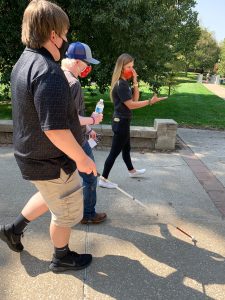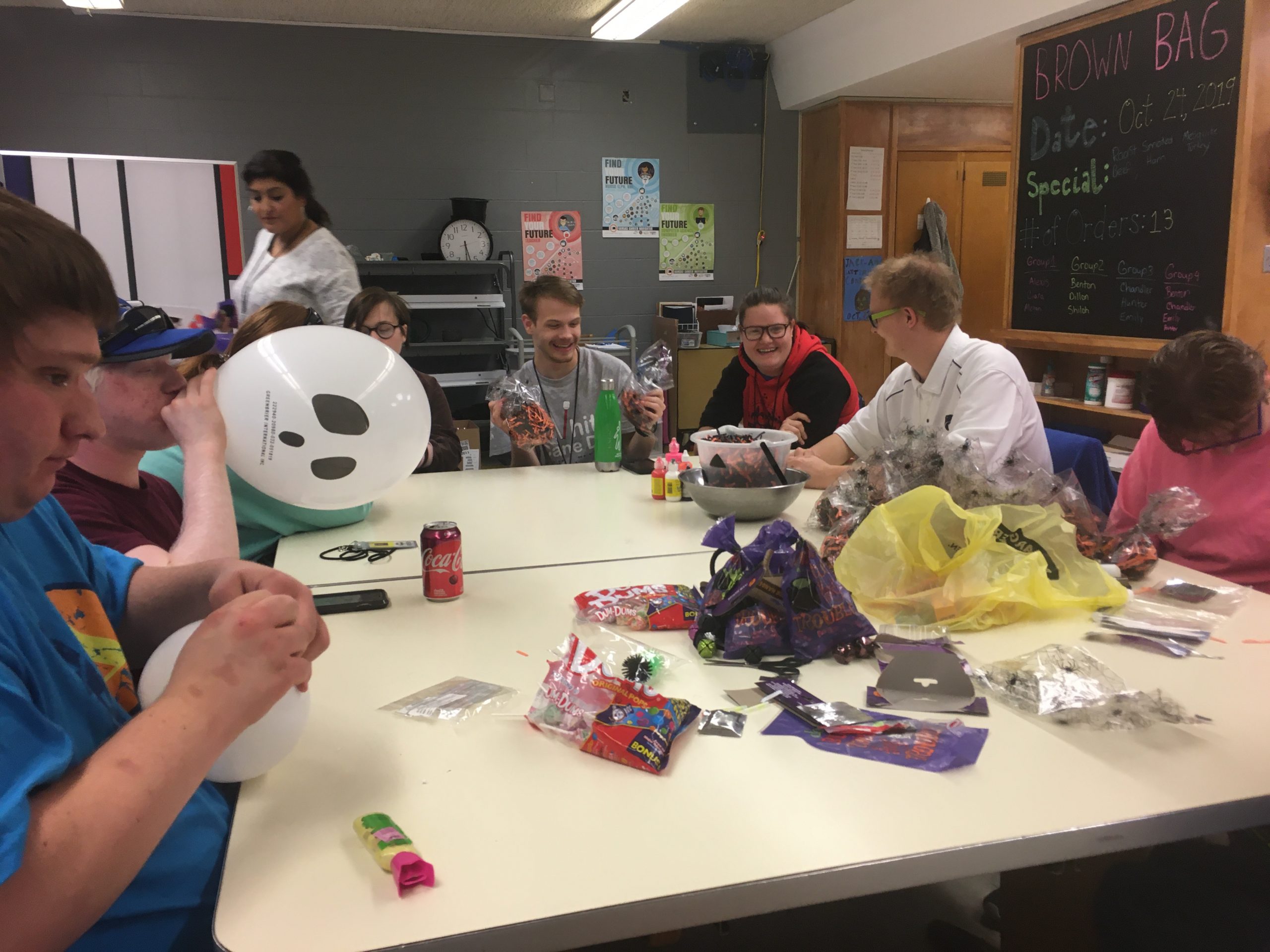“Go confidently in the direction of your dreams. Live the life you have imagined.” Henry David Thoreau
The Kansas State School for the Blind Transition Program is a one-year specialized program. An option to renew the program is based on team member decisions and progress toward goals identified in the student’s service plan.
About the Transition Program: (click to expand)
• An intensive, 9-month program for students who are blind/visually impaired aged 18-21 (Sunday-Thursday; August-May)
• $1000.00 per student, per year (9 mos.) If applying from out-of-state, please contact KSSB for cost
• Three pathways: Community College, Technical School, and/or Vocational Program
• Independent living skills are part of each student’s program
• Dorm, apartment, and/or cottage residential options
• Individualized instruction in the Expanded Core Curriculum
• Many students have paid work experiences
• KSSB coordinates services with student’s home school and IEP team
• Students in the transition program remain on an IEP
Residential Options: (click to expand)
Dorm
Apartment
Cottage
Students Gain: (click to expand)
Independent Living Skills
(Students develop the skills necessary to live independently, by graduating from the dorm to an on-campus apartment, then a free standing cottage when appropriate)
• Budgeting, banking and money management
• Personal hygiene and grooming
• Meal preparation
• Cleaning
• Organization of personal living space
• Time management
• Clothing care
• Meeting with transition staff in the candidates’ home community/school
• Approval from school district to support applicant and provide transportation
Orientation and Mobility Skills
• Opportunities for more advanced travel skills are available, including the use of public transportation to work or school, and the chance to plan one’s own outings
Assistive Technology Skills
(Students can improve their skills in technology adapted for visual impairments to access print and internet information through)
• Computers with screen readers and magnification
• Electronic magnifiers
• Electronic note takers
• Braille translation software
Compensatory Skills
• Improve skills in Braille or utilize low vision devices to read, write, and gather information in the most efficient way; organizational skills are emphasized
• Expand academic knowledge or specialized skills
Self Advocacy
• Students gain an understanding of their visual impairment and their accommodation needs for various environments and tasks
• Advocacy skills are taught and practiced through experiences at the college, on the job, in the apartment, and on community outings
Social Skills
• Students are able to develop and refine social skills formally through classes and reflections with staff, and informally through participation with others on or off campus
Three Pathways: (click to expand)
Career Education
• Gain knowledge of occupations
• Explore interests and abilities
• Develop skills to conduct an effective job search
College Prep
• Enroll at Kansas City Kansas Community College (KCKCC) while learning the skills necessary for college success
• Determining necessary accommodations and best format • Obtaining accommodations, technology and supplies
• Utilizing the college student services office and vocational rehabilitation
• Organizing and prioritizing coursework
Vocational Training
• On-the-job training at one or a variety of area businesses to develop the skills necessary to obtain and maintain employment while gaining valuable work experience
• Attend classes at the KCKCC Technical Education Center (TEC) to gain training and certification in one of 21 different technical programs

“My students who went through this program grew so much. I would proudly recommend it.”
— Anne Gurss, TSVI
Program Requirements (click to expand)
The following documents must be provided prior to the student’s arrival on campus in August.
- Recommendation from a TSVI
- Contact with a case manager (either from VR or DD)
- The completed application packet for the KSSB Transition Program
- Completed Person-Centered Plan with goals identified
- Meeting with transition staff in the candidates’ home, community/school
- Approval from school district to support applicant and provide transportation
Program Costs: (click to expand)
- $1000.00 per student, per year (9 mos.) If applying from out of state, please contact KSSB for cost.
- The annual fee to be paid to KSSB by the local district for the provision of services, including but not limited to: room & board, meals, instruction in O&M, social skills, DLS, assistive technology, self-advocacy, and other skills as identified by the team.
- Transportation costs paid by the local district
Steps to Apply for the KSSB Transition Program: (click to expand)
- Arrange a visit to our campus.
- KSSB and district staff meet to discuss the viability/cost/procedures of the student attending the Transition Program.
- An action plan is developed to outline the commitment required of all involved.
- Student arrives at KSSB in August to begin Transition Program.

Lori Smith, LMSW

Tim Schierbeck
Interested?
Use the button below to view the transition brochure and/or begin the transition request process.

Transition Program Areas of Emphasis
Students can improve their skills in technology adapted for visual impairments to access print and internet information through
- Computers with screen readers and magnification
- Electronic magnifiers
- Electronic note-takers
- Braille translation software
- Gain knowledge of occupations
- Explore interests and abilities
- Develop skills to conduct an effective job search
- Enroll at Kansas City Kansas Community College (KCKCC) while learning the skills necessary for college success
- Determining necessary accommodations and best format
- Obtaining accommodations, technology, and supplies
- Utilizing the college student services office and vocational rehabilitation
- Organizing and prioritizing coursework
- Improve skills in Braille or utilize low vision devices to read, write, and gather information in the most efficient way; organizational skills are emphasized
- Expand academic knowledge or specialized skills
Students develop the skills necessary to live independently, by graduating from the dorm to an on-campus apartment, then a free-standing cottage when appropriate
- Budgeting, banking, and money management
- Personal hygiene and grooming
- Meal preparation
- Cleaning
- Organization of personal living space
- Time management
- Clothing care
Opportunities for more advanced travel skills are available, including the use of public transportation to work or school, and the chance to plan one’s own outings
Bill of Rights for Children with Visual Impairments and their Families – COSB and AERBVI.
Program Description- KSSB’s Transition Program (STEPS)
KSSB Transition Program – Step by step Application Guide
- Students gain an understanding of their visual impairment and their accommodation needs for various environments and tasks
- Advocacy skills are taught and practiced through experiences at the college, on the job, in the apartment, and on community outings
Students are able to develop and refine social skills formally through classes and reflections with staff, and informally through participation with others on or off-campus
- On-the-job training at one or a variety of area businesses to develop the skills necessary to obtain and maintain employment while gaining valuable work experience
- Attend classes at the KCKCC Technical Education Center (TEC) to gain training and certification in one of 21 different technical programs


